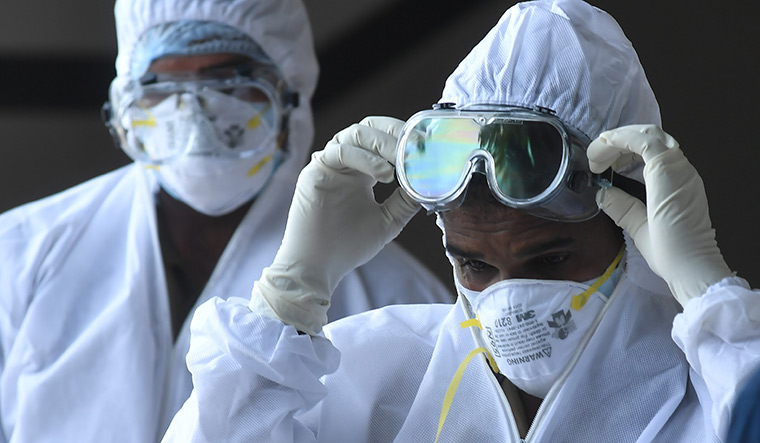The Nipah virus is back in the news after a 12-year-old boy died from the infection in Kozhikode district of Kerala early on Sunday morning.
The first Nipah virus outbreak in south India had been reported in Kozhikode district in May 2018, spreading subsequently to Malappuram. Seventeen people died in the 2018 Nipah outbreak. A Nipah case was reported in Ernakulam district in 2019. The first two Nipah outbreaks in India were reported in West Bengal, in 2001 and 2007.
What is Nipah virus?
Nipah is a 'zoonotic' virus, that is it can be transmitted to humans from animals such as bats and pigs. Nipah can also be transmitted through contaminated food or directly between people. In infected people, it causes a range of illnesses from asymptomatic (subclinical) infection to acute respiratory illness and fatal encephalitis, according to the WHO.
The first recognised Nipah outbreak in the world was reported among pig farmers in Malaysia in 1999.
How Nipah virus spreads
According to the WHO, in the first Nipah outbreak in 1999 in Malaysia, "most human infections resulted from direct contact with sick pigs or their contaminated tissues. Transmission is thought to have occurred via unprotected exposure to secretions from the pigs, or unprotected contact with the tissue of a sick animal". In outbreaks in Bangladesh and India, "consumption of fruits or fruit products (such as raw date palm juice) contaminated with urine or saliva from infected fruit bats was the most likely source of infection", according to the WHO.
Must cases of human-to-human transmission of Nipah were reported among family and caregivers of infected persons and people coming into contact with patients' bodily fluids and excretions.
What are symptoms of Nipah?
The WHO notes "Infected people initially develop symptoms including fever, headaches, myalgia (muscle pain), vomiting and sore throat. This can be followed by dizziness, drowsiness, altered consciousness and neurological signs that indicate acute encephalitis. Some people can also experience atypical pneumonia and severe respiratory problems, including acute respiratory distress. Encephalitis and seizures occur in severe cases, progressing to coma within 24 to 48 hours."
The incubation period of Nipah virus (interval between infection to onset of symptoms) is typically from four to 14 days. However, the WHO claims an incubation period of up to 45 days has also been reported.
Treatment options
According to the WHO, "There are currently no drugs or vaccines specific for Nipah virus infection... Intensive supportive care is recommended to treat severe respiratory and neurologic complications."
Prevention of Nipah
Among animals
· The WHO advises, "If an outbreak is suspected, the animal premises should be quarantined immediately. Culling of infected animals—with close supervision of burial or incineration of carcasses—may be necessary to reduce the risk of transmission to people. Restricting or banning the movement of animals from infected farms to other areas can reduce the spread of the disease."
· Routine and thorough cleaning and disinfection of pig farms with appropriate detergents may be effective in preventing infection.
Among humans
The National Centre for Disease Control recommends people:
· Wash hands with soap and water after coming in contact with a sick person or animal.
· Avoid consuming raw date palm sap or toddy.
· Consume only washed fruits.
· Avoid consuming half-eaten fruits from the ground.
· Avoid entering into abandoned wells.
· Handle dead bodies in accordance with the government advisory.










